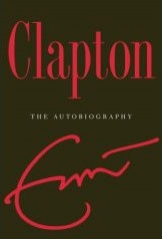Features
Clapton: The Autobiography
by Jeff Clutterbuck
Too often, we see music superstars who pass away long before their time. The list of the all time great rock musicians is littered with the names of those who died young: Jimi Hendrix, Janis Joplin, Jim Morrison, John Lennon, Kurt Cobain, Stevie Ray Vaughan, etc.
Today, it is not a stretch to imagine waking up, turning on the television, and seeing that Amy Winehouse has OD’ed. Thankfully there are still those who, against the odds, continue to play music and contribute in some manner despite having faced major problems and addictions. Eric Clapton is one of those people.
 Clapton usually is ranked near the top of any greatest guitarist list, and deservedly so. His work from the Yardbirds through his solo career has been brilliant and extremely influential for generations of aspiring musicians. As far as blues players go, he is the heir apparent to the old greats like King and Muddy Waters. From Top Ten albums to blistering solos, there is little Clapton has not done musically.
Clapton usually is ranked near the top of any greatest guitarist list, and deservedly so. His work from the Yardbirds through his solo career has been brilliant and extremely influential for generations of aspiring musicians. As far as blues players go, he is the heir apparent to the old greats like King and Muddy Waters. From Top Ten albums to blistering solos, there is little Clapton has not done musically.
Yet for all his fame, Clapton remains somewhat enigmatic. Some know tidbits and anecdotes about his life, but the average fan probably could not tell you more. Therein lies the appeal to reading Clapton’s take on himself; the reader gets a better sense of what kind of man he is. Suffice it to say, there is more to his life than merely having been the guitarist from Cream.
Summing up an entire person in one word is a difficult thing to do, but for Clapton one word really encapsulates everything: damaged. That becomes apparent from the opening page, and slowly comes more and more into focus as the book progresses. Clapton was a bastard, in the literal sense of the word. That was the first major hurdle of his life, which was followed by struggles with intimacy, heroin and alcohol. The majority of the text has Clapton discussing just how low his life would get at various points, and how he was able to climb back from those depths.
I will give Slowhand some credit; he did not sugarcoat things. His stories about the numbers of women he had affairs with and his general demeanor towards others does not paint a pretty picture of a “good” man. In fact, by the time I had finished the book, my overall perception of Eric Clapton had shifted towards being decidedly negative. He was and is a great guitarist, but for the most part he is not a person I would care to meet.
How much of autobiographies are actually written by their author is always interesting to me, but this is a work where it seems like Clapton had little help from the outside. The words and style are nothing particularly special, if an average person were to write about themselves, this is how it would sound. Anyone could pick up Clapton and find it a light, if slightly repetitive read.
Those looking for gossip and great rock and roll stories will find them, but surprisingly there are not that many. Clapton, as he would describe himself, enjoyed his privacy. From the comforts of his home in England he would entertain, but a major portion of his life was spent in that house by himself, or with whatever woman he had a relationship with at the time. Beatles fans will probably not enjoy his description of John Lennon, but George Harrison comes off as a well-meaning individual who was betrayed by Clapton in several instances.
The difference between Clapton, and say, Morrison, is that Clapton eventually got help for his problems. That is the redeeming aspect to his life story, and makes Clapton worth reading. It’s a miracle he survived both a terrible heroin and alcohol addiction, and it is clear he realizes just how damaging those events were to the people around him and to himself. I can’t help but at least feel respect for him having cleaned up his act, and as music fans we are the better for it.
One of the unfortunate events that strikes a chord was the death of his son Connor, for whom “Tears In Heaven” was written. The circumstances were so incredibly odd and terrible, and Clapton recalls them with perfect clarity. It is not an easy section to read, but it adds another dimension to the man.
In our society today, too often we idolize celebrities. The fact of the matter is they are people, just like you and me. The value to reading an autobiography like Clapton is that we can relate to them on a personal level and gain a deeper understanding of where they, and their songs, are coming from. For an inside look at the career of one of the most famous musicians of our time, and written in his own words, Clapton fits the bill.